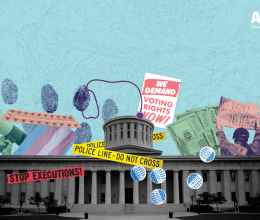When Fred L. Charon and his partner, Bruce Howe, turned off the Ohio Turnpike in desperation in April 1992, they could not have anticipated they would trigger a precedent-setting case for the rights of people with AIDS. Aided by the ACLU, their case became the first in which people with AIDS (PWAs) won protection from discrimination in public accommodations under the Americans with Disabilities Act (ADA).
In conjunction with World AIDS Day, December 1, we are celebrating the ADA’s thirtieth anniversary year, saluting the work of the ACLU, the plaintiffs, and the lawyers and physicians who secured critical protections for people with HIV/AIDS. Passed in 1990 and signed by President George H.W. Bush, the ADA has become a cornerstone of American civil rights. During that year, Congress intended the ADA to protect PWAs and people who were asymptomatic but carried the HIV virus, which causes AIDS. But in 1992 the courts had not yet ruled.
Charon and Howe were driving from their home in Maine to a vacation in Wisconsin. When he took the antibiotic floxin, Charon developed a serious reaction. A red rash covered most of his body. He vomited, developed a high fever, felt light headed, and had trouble grasping objects. Advised by his doctor in Maine to seek medical care immediately, the pair headed to Memorial Hospital, a community hospital in the small western Ohio city of Fremont.
Mark Reardon, the emergency room doctor who examined Charon, prepared to admit him. But Charles Hull, the vice chief of the medical staff, who needed to authorize the admission, balked. Although he did not examine Charon, Hull caviled that his condition was too serious for the Fremont hospital and ordered him sent to the hospital at Medical College of Ohio in Toledo, 45 minutes away.
A jury would eventually decide whether that decision was justified or was a “smokescreen.”
The Fremont hospital routinely treated severe drug reactions – most recently the very same condition in a 96-year-old woman. It was Charon’s AIDS condition that troubled Hull. He told Reardon, “If you get an AIDS patient in the hospital, you will never get him out.” Reardon regretfully told Charon and Howe that “this is a small community and the admitting doctor does not feel comfortable admitting him.” Reardon recorded Hull’s remarks in his notes and testified to that conversation in court. Ironically, as the Toledo Blade later reported, several community hospitals treated several AIDS patients annually.
Outraged by what he saw as discrimination, Howe called the ACLU of Ohio. Christine Link, the recently appointed Executive Director, recalled that the case represented a departure for some board members who had focused on First Amendment cases. Encouraged by their national affiliate, the ACLU of Ohio filed suit in federal court in Toledo, contending that Fremont hospital’s refusal to treat Charon violated various federal statues, principally the new ADA.
The ACLU of Ohio turned to an attorney ideally suited to pursue the case -- Ellen Simon, who specialized in both civil rights law and medical malpractice. A longtime ACLU of Ohio board member, she had also served as chair of the Cleveland chapter. With help on briefs from ACLU’s New York office, she agreed to take the time-consuming case pro bono.
Notable is that Western Ohio was not an ideal venue for bringing an AIDS discrimination case in the early 1990s. PWAs suffered intense stigma. With the heroic exception of Surgeon General C. Everett Koop, the Reagan administration displayed indifference – and ultimately much worse – to the pandemic. Koop said some high-ranking members of the Reagan administration believed that death was a suitable punishment for people with AIDS. Discriminatory legislation abounded. Many states, including Ohio, criminalized transmission of HIV (many such laws remain in force). Quarantine of PWAs was widely discussed. Republican Senator Jesse Helms of North Carolina spearheaded legislation that barred HIV immigrants or tourists from admission to the United States (the travel ban was finally lifted in 2009). In the early 1990s – the bleakest years of the pandemic in the U.S. – the annual death toll from AIDS rose to nearly 50,000, mainly among gay men, but also increasing numbers of women and injection drug users. Until the new protease inhibitor drugs, first prescribed in the mid-1990s, transformed AIDS from what was usually a death sentence to a chronic condition, it seemed likely a million people would die in twenty years.
Charon died in early 1993, but Judge John Potter allowed the suit to go forward, now under the rubric Howe v. Hull. The judge rejected the defendants’ motions for summary judgment. Simon and the ACLU were prepared to settle for $3,000, the costs incurred thus far. But the defendants turned down a settlement. Astonished, Potter told the defendants: “You just turned down the Louisiana Purchase.”
Going to trial, Simon was confident. “I had the Rodney King tape,” she said, making an analogy about irrefutable evidence. Nonetheless, as attorney Doris Wohl said, “we were very worried” whether jurors would see past AIDS stigma. Link feared the ACLU would lose. With help from a jury consultant, Simon screened prospective jurors by asking, “Would you take your child to a pediatrician who treats children with AIDS?”
The colorful optics in the Toledo courtroom threatened to complicate an already sensitive case. Simon described herself as “a left-wing Jewish lawyer from Shaker Heights.” Wohl was a fiery disabilities lawyer from Toledo. Marc Elovitz represented ACLU’s New York office. Howe resisted entreaties to remove his earring. The key expert witness, who volunteered his services, was Leonard Calabrese, a nationally known AIDS doctor from the Cleveland Clinic, who sported long hair. He asked Simon if he should wear it up or down; he appeared with a pony tail.
Calabrese did not see himself as a “crimson crusader,” but “over time, I just got pissed off” about discrimination against PWAs,” he said. Charon’s treatment would have been simple. “There was nothing to argue over,” he said. Charon was “turfed” by the Fremont hospital. But the defendants were dug in and “not contrite,” Calabrese recalled.
Initially voting five to three in favor of the defendants, the jury deliberated for six days. According to Simon, the wait was “torture.” The jury finally determined that the hospital’s claim that it could not treat Charon’s drug reaction was (in Potter’s words) a “pretext.” Potter wrote in a subsequent finding of fact: “Charon’s HIV/AIDS status was the motivating factor” in refusing to admit him. The jury awarded Charon’s estate $62,000 in compensatory damages, along with punitive damages of $150,000 from Hull and $300,000 from the hospital.
Potter issued his ruling in November 1994, concluding that AIDS and HIV are both “disabilities within the meaning of the ADA.” He also ordered the Fremont hospital to post signs in its waiting room saying the facility does not discriminate against people with HIV or AIDS. A former mayor of Toledo steeped in Republican politics, Potter was appointed to the bench by President Reagan in 1982. Wohl remembers Potter as genial and humane.
“We made the law,” said Simon. “It was a really meaningful verdict.” For the first time, a federal court had decided that the ADA prohibited discrimination against people with HIV/AIDS in public accommodations.
Eventually, the U.S. Supreme Court enshrined these rights in a key decision, Bragdon v. Abbott, in 1998. Justice Anthony Kennedy, who wrote the major gay rights decisions of the past twenty years, held in the majority opinion that HIV infection is a disability within the meaning of the ADA “from the moment of infection.” Kennedy was joined in his opinion by Justices Ruth Bader Ginsburg, John Paul Stevens, Stephen Breyer, and David Souter. Chief Justice William Rehnquist dissented, along with Clarence Thomas and Antonin Scalia; Sandra Day O’Connor dissented in part.
The Americans with Disabilities Act continues to afford critical protection for people with HIV, although cases still continue about its scope. In a Toledo courtroom a quarter century ago, a judge and jury rose above stigma to lay a foundation for protecting the rights of people with HIV and AIDS. The struggle to protect their rights continues, as stigma, though partially abated, endures, and strenuous efforts continue to maintain disability rights and overturn obsolete criminalization statutes.
Clayton Koppes is professor of history emeritus at Oberlin College, where he was on the faculty for 42 years. With his husband, David Kelly, he is writing a history of HIV/AIDS in the U.S.
The principal sources for this article are Charon v. Memorial Hospital, later Howe v. Hull, 873 F. Supp. 70 (1994), 73-80, ACLU of Ohio Newsletter Fall 1994, phone interviews with Ellen Simon, Nov. 18 and 24, 2020, Leonard Calabrese, Nov. 23, 2020, Doris Wohl, Nov. 23, 2020, and Christine Link, July 27, 2020, Toledo Blade, June 15, 1994, and Ronald Bayer and Gerald Oppenheimer, AIDS Doctors: Voices from the Epidemic, An Oral History [2000].





